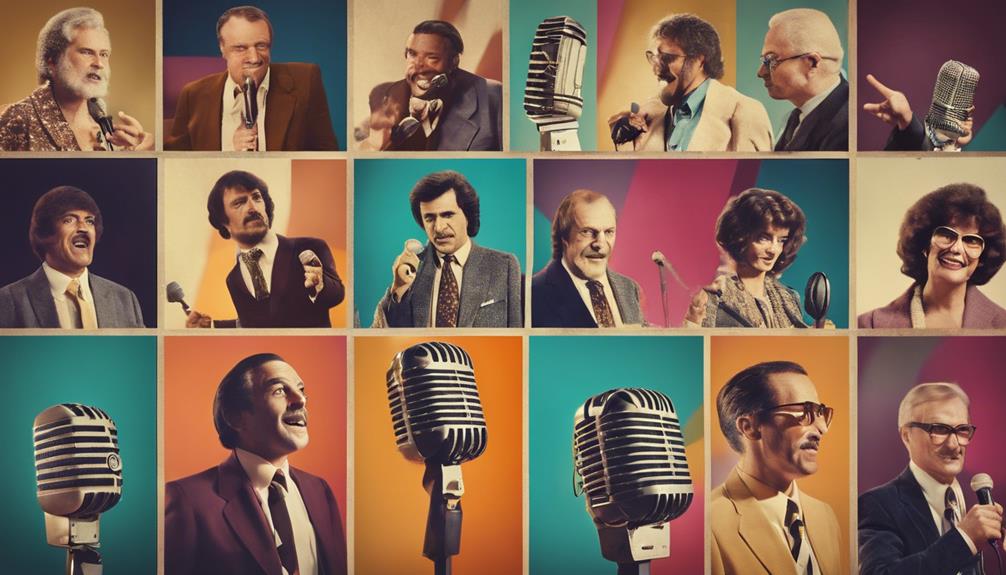Motivational speaking has evolved dramatically since the 70s and 80s. Back then, pioneers like Zig Ziglar and Tony Robbins shaped the personal development landscape with their engaging messages of hope and resilience. Today, speakers incorporate technology, engaging storytelling, and evidence-based practices into their presentations. There's a strong focus on mental health, diversity, and inclusion, making motivational content more relatable and accessible. The rise of virtual events has also transformed how audiences connect with speakers. As this field continues to adapt to new trends, you'll find richer insights into what drives effective motivation today.
Key Takeaways
- Motivational speaking emerged as a distinct profession in the 1970s and 1980s, led by figures like Zig Ziglar and Tony Robbins.
- The focus shifted from traditional storytelling to interactive engagement, incorporating multimedia and authenticity in presentations.
- Current trends emphasize mental health awareness, diversity, and inclusion, reflecting societal challenges and values.
- The rise of virtual events and online courses has increased accessibility and expanded audience reach globally.
Legacy of 70s and 80s Speakers
The legacy of 70s and 80s motivational speakers like Stephen Covey and Zig Ziglar has profoundly shaped the personal development industry that we recognize today. Their emphasis on empowering individuals through positive thinking created a framework that many still rely on, reflecting the growing demand for motivational content and speakers in today's society.
Covey's "7 Habits of Highly Effective People" continues to serve as practical advice for those seeking personal growth and fulfillment, while the influence of motivational speakers is expected to grow further due to factors like increased recognition of motivation's power.
Zig Ziglar's engaging storytelling and humor captured audiences, making his messages relatable and inspiring. His ability to connect through shared human experiences fostered an environment where people felt motivated to take action.
The influence of these speakers reaches far beyond their time, inspiring new generations to pursue their goals and dreams. Speakers like Bill Clennan also contributed to this legacy by using storytelling to drive home important lessons.
Their collective work established essential communication techniques that continue to resonate in today's motivational speaking landscape. You can see their impact in countless seminars and self-help books, as the desire for improvement and success remains a fundamental aspect of human nature.
The 70s and 80s speakers laid the groundwork, making personal development accessible to everyone.
Pioneers of Personal Development

Pioneers of personal development, like Zig Ziglar and Stephen Covey, sparked a movement that transformed how people approach self-improvement and motivation.
As influential motivational speakers, they popularized practical advice that resonated with audiences, emphasizing messages of hope and resilience that continue to inspire. Ziglar's humorous storytelling captivated listeners, helping them embrace empowerment and resilience in their lives. His engaging style laid the groundwork for many coaching programs that continue to inspire.
Stephen Covey's "The 7 Habits of Highly Effective People" became a cornerstone in the personal development field, guiding individuals and organizations toward enhanced employee motivation and improved corporate culture. His insights provided actionable steps for personal and professional growth, proving that effective habits lead to success.
Bill Clennan also made a mark during this era, using impactful storytelling to inspire action and foster a sense of community among those seeking personal growth.
The legacy of these pioneers shaped the messaging and practices that remain crucial in today's motivational speaking landscape. Their emphasis on personal development continues to influence new generations, reminding you that the journey of self-improvement is both attainable and essential in achieving your goals.
Themes of Hope and Resilience

Emphasizing hope and resilience, motivational speakers have inspired countless individuals to face challenges with a positive mindset and unwavering determination. Icons like Zig Ziglar and Claire Wineland have shown how powerful these themes can be.
Ziglar, with his engaging humor, taught you the importance of daily motivation, pushing you to cultivate resilience when life gets tough. His messages remind you that maintaining a positive outlook is essential for overcoming adversity. In addition, the role of curiosity in learning can enhance your ability to embrace challenges, fostering a mindset that champions growth and exploration.
Claire Wineland brought authenticity to her talks, sharing her personal battles with illness while advocating for hope and resilience. Her journey resonated deeply, emphasizing that even in the darkest moments, you can find strength and empowerment. This focus on positive thinking has sparked a ripple effect, inspiring self-improvement and personal growth across generations.
Today, the relevance of hope and resilience remains strong, as motivational speakers continue to address mental health and personal growth. They encourage you to embrace these themes, reinforcing that you have the power to rise above challenges. By focusing on hope and resilience, you can foster a mindset that not only uplifts you but also empowers those around you.
Jacob Morgan's Insights on Leadership

Jacob Morgan shares powerful insights on leadership that highlight the importance of prioritizing employee experience for organizational success. His research shows that when employees feel valued, organizations thrive.
To cultivate a positive culture and boost engagement, he suggests focusing on these three key strategies:
- Enhancing Communication: Foster open dialogue to understand employee needs and concerns. This aligns with the importance of effective communication in demonstrating leadership skills and building rapport with team members <a target="_blank" href="https://great-money.com/career-and-professional-development/">effective communication fosters clarity</a>.
- Investing in Development: Provide training and resources to empower your team in a digital workforce. This commitment to continuous learning reflects resilience and adaptability in a rapidly changing environment.
- Recognizing Contributions: Celebrate achievements to motivate and retain top talent. This practice not only boosts morale but also helps to create an environment where emotional intelligence can flourish.
In motivational speaking, Jacob Morgan emphasizes that leadership isn't just about authority; it's about creating an environment where employees feel inspired and engaged. His books, like "The Employee Experience Advantage," offer research-backed strategies that guide leaders in steering through contemporary challenges.
By establishing a supportive atmosphere and implementing innovative strategies, you can drive organizational success and improve overall satisfaction. Morgan also founded The Future of Work University to equip leaders with essential skills necessary for today's workforce.
Embracing his insights can transform your leadership approach and ultimately lead to a more engaged, productive team.
Current Trends in Motivational Speaking

Today's motivational speaking landscape is shaped by key trends that focus on mental health awareness, work-life balance, and diversity, reflecting the pressing challenges and values of our society.
As you engage with motivational speakers today, you'll notice they use engaging storytelling and personal narratives to resonate with diverse audiences. This connection is essential, especially as contemporary societal challenges demand a more empathetic approach.
Moreover, many speakers are incorporating evidence-based practices into their talks, ensuring that the insights you gain are grounded in research. This trend enhances the credibility of the messages delivered, making them more impactful for personal and professional growth.
The rise of virtual events and online workshops has also transformed how motivational speaking is delivered. You can now access inspiring talks from anywhere in the world, making it easier to find content that speaks to your specific needs.
This shift not only increases accessibility but also allows speakers to reach a broader audience, creating a rich tapestry of experiences and insights. By embracing these trends, motivational speaking continues to evolve, providing valuable support as you navigate life's complexities.
Frequently Asked Questions
When Did Motivational Speaking Begin?
Motivational speaking's roots trace back to ancient societies, where leaders inspired people through oratory. It gained formal recognition in the 19th century with influential self-help literature, shaping today's personal development conversations you often hear.
Who Is World No. 1 Motivational Speaker?
Tony Robbins attracts thousands to his seminars each year, generating over $100 million annually. If you're seeking inspiration, he's often considered the world's number one motivational speaker, transforming lives with his powerful techniques and engaging style.
Who Is the Father of Motivational Speaking?
You might know Earl Nightingale as the father of motivational speaking. His influential work in the 1950s, particularly "The Strangest Secret," emphasized positive thinking and goal setting, shaping the genre and inspiring countless speakers thereafter.
What Is the Purpose of Motivational Speaking?
The purpose of motivational speaking is to inspire you and empower your mindset. It encourages personal growth, connects emotionally through storytelling, and provides practical advice, helping you overcome challenges and endeavor towards achieving your goals.
How Have Motivational Speaking Techniques Evolved Over Time and Who were the Influential Speakers of the Past?
Motivational speaking techniques have evolved significantly over time, with influential speakers paving the way for modern practices. In the past, individuals like Dale Carnegie and Zig Ziglar were considered pioneers in the field, shaping the profiles of influential speakers today. Their impactful storytelling and motivational strategies continue to inspire audiences worldwide.
Conclusion
As you journey through the vibrant landscape of motivational speaking, you can see how the seeds planted by pioneers in the 70s and 80s have blossomed into a rich tapestry of inspiration today.
Each speaker's voice resonates like a lighthouse, guiding you through the storms of doubt and uncertainty.
Embracing the themes of hope and resilience, today's motivational scene invites you to soar, igniting your passion and empowering you to chase your dreams with unwavering determination.










